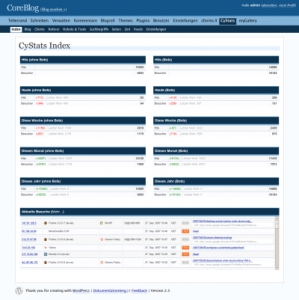The best way to deliver your information to the world requires the best content management. We explore WordPress as one of the tools you can use. We stick to Open Source solutions that run on Linux utilizing MySQL.
Over at the WordPress Codex you will find an overview of WordPress 2.7’s (potentially) upcoming features.
A number of additions to this new version will be good news to the people who develop WordPress themes and WordPress plugins, but we discovered several notable entries that will be of interest to users and administrators.
- The ability for readers to subscribe to a post’s comments is now part of the core, and does not require the “Subscribe to Comments” plugin (a plugin we install on every one of our client’s sites!).
- Sitemaps, a file format developed by Google, is a very powerful tool for informing search engines (not just Google) about where your content is, what it is, and how frequently it’s updated. Currently, in WordPress 2.6, a plugin is needed to automate this process; WordPress 2.7 will apparently make this part of the core. We can only speculate if the same level of functionality will be present in the core implementation versus the “Google XML Sitemaps” plugin that we use.
- In WordPress 2.6 and below, comments on posts have no heirarchy, and how one reader “responds” to another reader is not dealt with in any officially sanctioned manner – it’s basically a flat listing of comments. The Codex entry hints at “comment threading”, which potentially means comments can be nested, like a message board. This might be a dream come true for sites with large, active communities.
- Geotagging is growing in popularity, and it gets a mention in the Codex. How this will be implemented is currently an unknown, but for some bloggers, especially those who use their WordPress site to organize events, could really benefit from a unified way to introduce geodata into their posts.
- Lastly, we see “versioning of template edits”. We surmise that this means template editing from the Dashboard will have some form of version control, like Posts do in 2.6, and ultimately, it implies enhanced theme editing abilities in the Design section of the Dashboard. For people like us who do frequently template wrangling, this might be one of the best things to happen to WordPress since its original conception!
We will keep posting as we learn more about WordPress 2.7.
If you’re interested in how you can leverage WordPress/blogging to increase your online visibility, we humbly suggest you take our inexpensive, informative, one day seminar – Websitetology.
We just found the new WordPress statistics plugin Cystats, and have fallen in love with it. This is a powerful little tool that we found searching through the 83 statistics plugins listed in the WordPress directory. It’s so powerful that it even has stuff that Google Web Analytics doesn’t have- and displays it all, in your dashboard to help you analyze your WordPress site.
Cystats plugin is easy to install and set up;upload the files to your wp-content/plugins directory, and then activate it in the backend. You’ll immediately be able to see the most commented and visited pages and posts, as well as start recording visitor trending, searchbot visits, search strings, top referrers and more. There’s even a way to see the screen resolution and web browser that your visitors are using to view your website (mobile views should be going up too).
You can download Cystats by clicking the link below. Here’s a screenshot :
People often ask- how big a site can I do with WordPress?
CNN big enough for you?
CNN Political Ticker: All politics, all the time – Blogs from CNN.com



